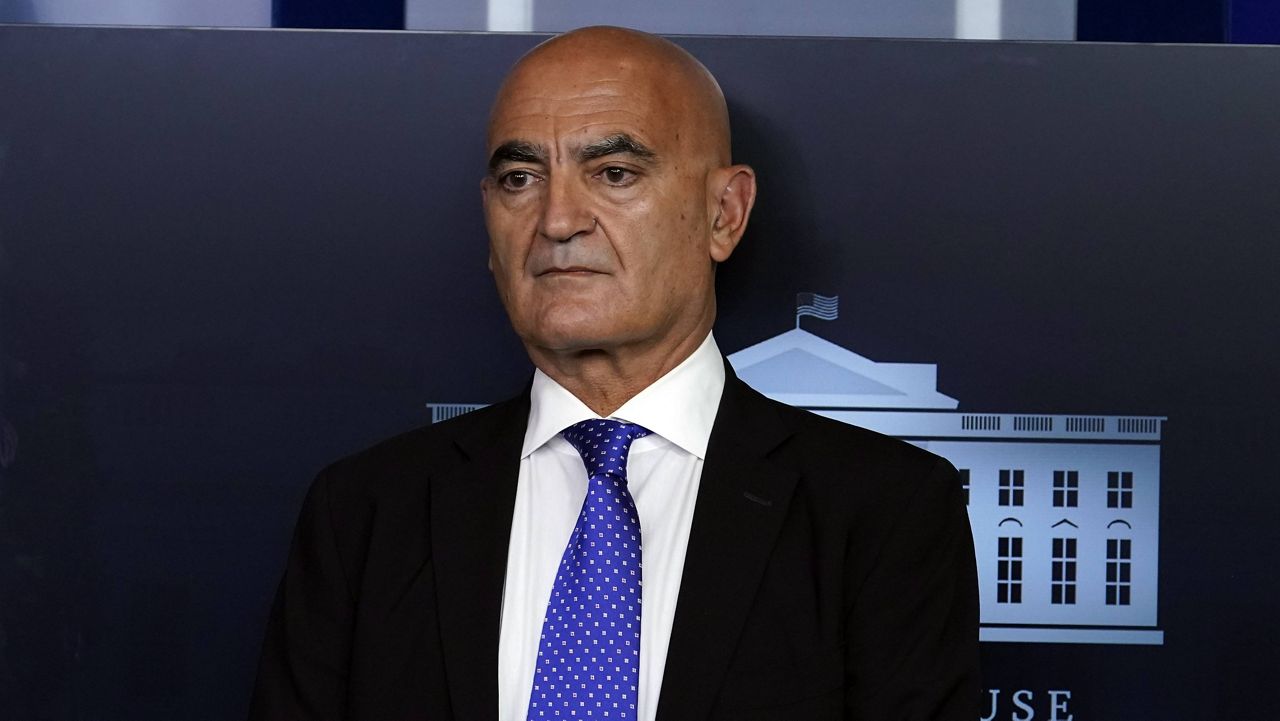WASHINGTON — As part of a “vaccine summit” Tuesday, President Donald Trump plans to sign an executive order that would prioritize vaccinating Americans for COVID-19 before distributing doses to other countries.
What You Need To Know
- President Donald Trump plans to sign an executive order that would prioritize vaccinating Americans for COVID-19 before distributing doses to other countries
- Asked Tuesday morning to clarify the intent behind Trump’s executive order, Operation Warp Speed's Dr. Moncef Slaoui said, "Frankly, I don't know"
- The Trump administration passed on a chance to lock in an additional 100 million doses for delivery in the second quarter of 2021
- Scrutiny over that decision threatens to overshadow Tuesday’s summit, aimed at celebrating the expected approval of the first vaccine in the coming days
It’s not clear how or if the Trump administration could enforce the order, and the declaration will come a day after news reports surfaced saying the federal government passed this summer on a chance to buy millions of additional doses of Pfizer’s vaccine, which could be approved for emergency use in the coming days.
That decision could delay the delivery of a second batch of doses until Pfizer fulfills other international contracts. In November, the pharmaceutical company agreed to make 200 million doses available to the European Union, with the option for 100 million more after that.
Asked Tuesday morning to clarify the intent behind Trump’s executive order, Dr. Moncef Slaoui — chief science adviser for Operation Warp Speed, the government initiative to expedite coronavirus vaccines — had no answer.
“Frankly, I don’t know. And frankly, I’m staying out of this. I can’t comment,” Slaoui told ABC’s “Good Morning America.”
“Our work is rolling,” he added. “We have plans. We feel that we can deliver the vaccines as needed, so I don’t know exactly what this order is about.”
Under its contract with Pfizer, the Trump administration committed to buy 100 million doses for $1.95 billion, with an option to purchase as many as five times more.
This summer, the White House opted not to lock in an additional 100 million doses for delivery in the second quarter of 2021, according to people who spoke to The Associated Press about the matter on the condition of anonymity because they were not authorized to discuss it publicly.
The administration's decision not to lock in additional Pfizer purchases last summer was first reported by The New York Times.
Late Monday, a senior administration official denied that report. The official said that if Pfizer or another company had offered to sell more of its vaccine over the summer — without FDA approval — that company was “just not going to get the government’s money.”
The official also said they are confident the U.S. will have enough doses to vaccinate all Americans by the end of June 2021. That includes six vaccine candidates in their final stages, which could account for up to 3 billion doses, according to the official.
Slaoui echoed that sentiment Tuesday.
“We are comfortable we will be getting vaccines to the people who need them as soon as possible because ... there are vaccine doses from Pfizer, we will work with Pfizer to try and increase capacity and have those vaccines available,” he said. “We have two more vaccines from J&J [Johnson & Johnson] and AstraZeneca that will be completing their Phase 3 trials in January, and most likely, I hope, be approved for use in February. We have tens of millions of doses from those vaccines participating to the volume of vaccines we need to immunize the U.S. population as we promised all of it by the middle of the year 2021, and that’s still on track.”
Scrutiny over the decision to pass on the Pfizer doses threatens to overshadow Tuesday’s summit, aimed at celebrating the expected approval of the first vaccine, developed by Pfizer and its German partner, BioNTech. Trump’s administration is seeking to tamp down public skepticism over the vaccine and secure a key component of the Republican president's legacy.
The focus was to be on the administration’s plans to distribute and administer the vaccine, but officials from President-elect Joe Biden’s transition team, which will oversee the bulk of the largest vaccination program in the nation’s history once he takes office Jan. 20, were not invited.
The Operation Warp Speed summit will feature Trump, Vice President Mike Pence and a host of government experts, state leaders and business executives, as the White House looks to explain that the vaccine is safe and lay out the administration’s plans to bring it to the American people.
Officials from the pharmaceutical companies developing the vaccines also were not expected to attend, despite receiving invitations, according to people familiar with the matter. Some expressed concerns about the event contributing to the politicization of the vaccine development process and potentially further inhibiting public confidence in the drugs.
The senior administration official told reporters Monday the White House ultimately decided against including Pfizer and Moderna because it felt it was not appropriate to have both them and Peter Marks, director of the Food and Drug Administration’s Center for Biologics Evaluation, at the summit.
The FDA is holding a meeting Thursday of its outside advisory panel to discuss Pfizer and BioNTech’s application. The agency will hold a similar meeting Dec. 17 for the vaccine developed by Moderna, which worked with the National Institutes of Health.



